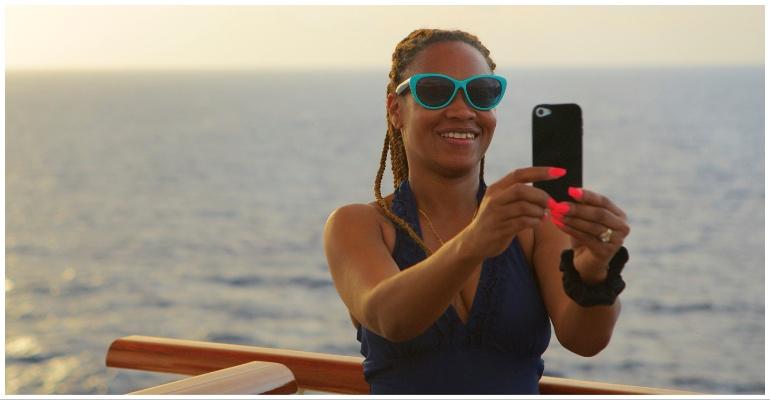With WMS's Verizon Cruise Daily Pass, customers get data, voice and text — 0.5GB of data as well as 50 minutes of calling and unlimited text messages for a 24-hour period. The cost is $30 per line per day, and customers pay only for days they use cellular while at sea.

WMS pioneered the first wireless network on a cruise ship 20 years ago
The Cruise Daily Pass is available on more than 200 cruise ships and replaces the previous data-only plan.
'We are thrilled to expand our longstanding partnership with Verizon to develop the Verizon Cruise Daily Pass for today’s connected passenger,' said Pramod Arora, president and CEO, WMS. 'Through our innovative wireless connectivity, Verizon customers can now enjoy this latest data, voice and text plan, never before available while cruising.'
Details are here.
Telenor Maritime and AT&T 5G roaming
Telenor Maritime said its new AT&T Cruise International Day Pass enables passengers to use their phones at sea without the worry of bill shocks, thanks to a fixed daily rate: $15 per 24-hour period per line.
This includes calls, texts and the same data plan the customer has at home. The daily fee is charged only when users receive a call, send a text or use data.

Telenor Maritime’s mobile network spans more than 280 ships globally, including ferries
Telenor Maritime’s mobile network spans more than 280 ships globally, including ferries, catering to millions of passengers daily.
'We are excited to introduce this revolutionary roaming product, in partnership with AT&T,' said Håkon Berdal, commercial roaming manager at Telenor Maritime. 'This initiative underscores our unwavering commitment to enhancing the passenger experience by providing seamless connectivity solutions that transcend the boundaries of traditional maritime communication.'
Details are here.
WMS Seatrade Cruise Global attendee survey
WMS rolled out its Verizon Cruise Daily Pass earlier this month at Seatrade Cruise Global, where it also surveyed attendees on wireless connectivity usage and preferences.
Sixty-three percent of survey respondents said they use the internet for several hours each day when cruising for leisure, behavior that aligns with usage growth WMS supports with its services.
Exploding demand
'Demand for connectivity has exploded since the industry’s return to sea, with passengers and crew members indicating communication and entertainment is becoming more essential,' WMS CEO Arora said. He added that WMS pioneered the first wireless network on a cruise ship 20 years ago, and has continued innovating, from offering 3G and 4G LTE to daily passes and bundles, with 5G connectivity at sea coming.
Research WMS conducted in 2023 showed passengers are most satisfied with their onboard connectivity when using both cellular and Wi-Fi services together. Similar to on land, internet-over-cellular is an ideal option for secure banking and moderate emailing, browsing, social posting, video calling and music streaming. In contrast, Wi-Fi is ideal for heavy internet use, emailing, browsing; streaming services for video, movies and music; and data-intensive app usage.
In other WMS findings from the Seatrade Cruise Global attendees surveyed, 80% said they use the internet when cruising for a combination of personal and business use, while 10% access it solely for business and 10% only for personal commuications.
According to those surveyed, the top three communication services at sea are text messaging, messenger apps and phone calls.
Copyright © 2024. All rights reserved. Seatrade, a trading name of Informa Markets (UK) Limited.
Add Seatrade Cruise News to your Google News feed.  |

